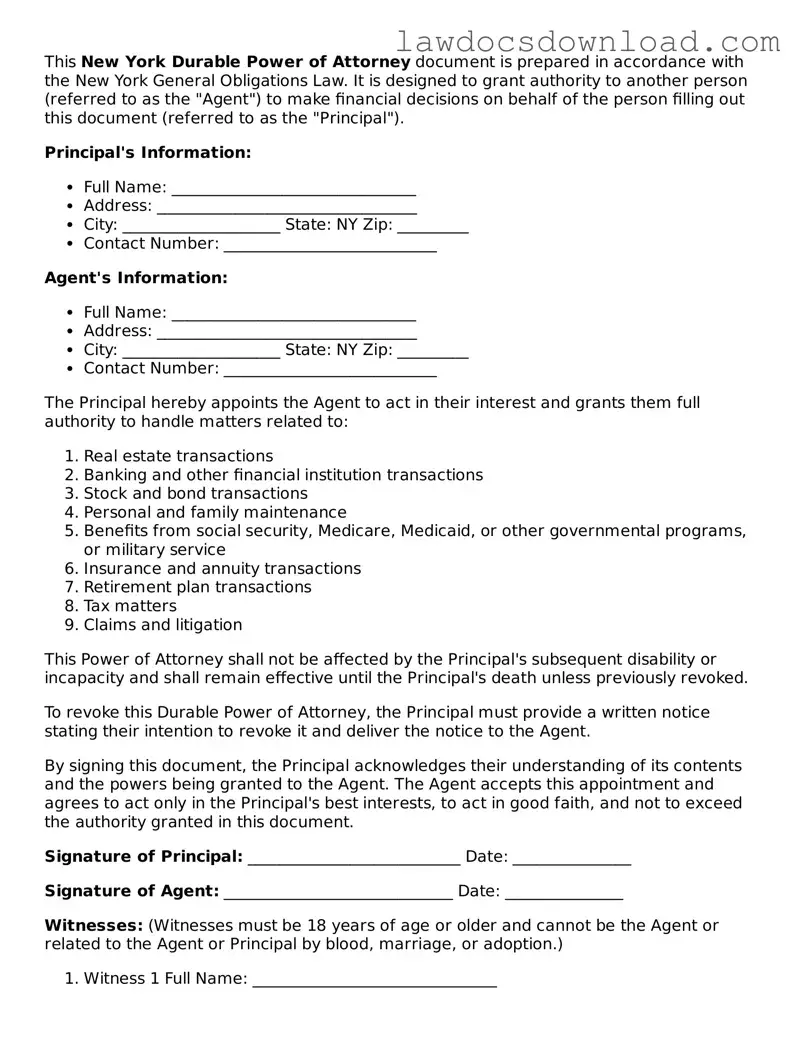The New York Durable Power of Attorney form shares similarities with a Health Care Proxy, which also serves as a delegated authority document. While the durable power of attorney permits an individual to appoint someone else to handle financial or legal matters on their behalf, a health care proxy specifically delegates the authority to make medical decisions when the principal is unable to do so themselves. Both documents are critical in planning for incapacity and ensure that a trusted person can make important decisions on one's behalf.
Comparable to a Living Will, the New York Durable Power of Attorney form sets forth arrangements in anticipation of situations where the principal might not be able to communicate their wishes directly. However, while a living will mainly outlines a person's preferences regarding end-of-life medical care, the durable power of attorney encompasses a broader range of authorities, including financial and legal decisions, beyond health care matters.
Similar to a Last Will and Testament, which details how a person's estate should be distributed after death, the New York Durable Power of Attorney form deals with the management and protection of the principal's assets during their lifetime. The main difference lies in their operative timeframes: the durable power of attorney is only effective during the principal's lifetime, especially in cases of incapacity, while a last will and testament takes effect upon the principal's death.
A Revocable Living Trust bears similarity to the New York Durable Power of Attorney by allowing individuals to manage their affairs either directly or through an appointed trustee. While a living trust is focused on asset management and avoidance of probate, the durable power of attorney provides broader authority, including non-financial actions. Both documents play pivotal roles in estate planning to safeguard an individual's interests during their lifetime and beyond.
The New York Durable Power of Attorney form is akin to a General Power of Attorney but with the key distinction of remaining in effect even when the principal becomes incapacitated. While both documents allow an individual to grant another person the authority to make decisions on their behalf, a durable power of attorney's enduring nature is particularly designed to ensure continuous management of the principal's affairs under such circumstances.
Sharing objectives with a Springing Power of Attorney, the New York Durable Power of Attorney form also involves pre-planned delegation of authority. However, a springing power of attorney is designed to become effective only upon the occurrence of a specified event, typically the incapacity of the principal. This contrasts with the durable power of attorney's immediate effect upon execution, providing seamless continuity of authority without the need for proving incapacity.
An Advance Directive, like the New York Durable Power of Attorney, is another instrument for incapacity planning. It combines the aspects of a living will and a health care proxy, focusing on health care decisions. Both documents ensure that a person's wishes regarding their personal and medical care are respected and implemented, should they be unable to make those decisions themselves at any point.
The Financial Power of Attorney is closely related to the New York Durable Power of Attorney, with both documents granting someone else the authority to handle financial matters on the principal's behalf. The distinction often lies in the scope and duration of the powers granted. The "durable" aspect signifies that the power of attorney remains in effect if the principal becomes incapacitated, a crucial provision that may or may not be explicitly stated in a financial power of attorney.
Lastly, the Limited Power of Attorney is similar to the New York Durable Power of Attorney in that it grants someone else the authority to act in the principal’s stead. However, it is narrowly tailored to specific transactions or timeframes, unlike the durable power of attorney's broad and enduring grant of authority. This focus makes the limited power of attorney useful for specific purposes without providing comprehensive control over all of the principal’s affairs.

